Europe must keep pace with the digital economy
Interview with Néstor Duch-Brown, co-organizer of the JRC-TSE workshop on liability in the digital economy.
 Néstor Duch-Brown is a scientific officer and team leader at the Digital Economy Unit of the European Commission's Joint Research Centre (JRC). His current work focuses on digital economics, with a particular emphasis on online platforms and the economics of digital data. More broadly, his research aims to quantify the economic impact of digital and ICT technologies to provide evidence to policymakers while contributing to economic research. He is also advisory member of the TSE Digital Center.
Néstor Duch-Brown is a scientific officer and team leader at the Digital Economy Unit of the European Commission's Joint Research Centre (JRC). His current work focuses on digital economics, with a particular emphasis on online platforms and the economics of digital data. More broadly, his research aims to quantify the economic impact of digital and ICT technologies to provide evidence to policymakers while contributing to economic research. He is also advisory member of the TSE Digital Center.
Here, Nestor looks back on the JRC-TSE workshop, held in July, which brought together academics, policymakers, and practitioners to discuss the latest developments regarding liability in the digital economy.
Platform liability and AI and liability were the two central topics at this event.
What are the key concerns in this area?
Although apparently, we are talking about two different topics, the underlying concerns are similar. The core issue is that the development and adoption of digital technologies in almost all areas of human activity is occurring faster than the corresponding development and adoption of regulation. Until relatively recently, technology was a rather small industry – in the early 90s the internet had hate speech and some products and services included primitive forms of AI – and it did not affect most people’s lives in a significant way.
Today, when software and algorithms have become mainstream, all the problems we face as a society can be expressed in software as well. When we connect everyone, we bring in good people and bad people. When we automate decision-making, we lose control of the process. Now the problems are amplified because they involve a lot more people, they combine and feed each other, and generate new externalities. In this new setting, with new actors emerging in economic and social activities, we need to rethink the rules of the game. To do so in an organized and efficient way, we need to understand what the main issues are and how liability – either in the case of platforms or AI – should be allocated.
How did contributors at the event attempt to improve our understanding of these issues?
This is an emerging area for research, policy, and practice. By bringing in relevant participants from all these areas, the workshop was able to create a space for multilateral exchange of experiences and knowledge. These communities have been working on these topics for some time, perhaps independently. For me, the most important aspect of the workshop was that all participants attended with an open mind and a willingness to share their knowledge and experiences, but also to learn from the others. This atmosphere of cooperation and learning will hopefully set the basis for an informal network embracing the advancement of knowledge and practice around liability in the digital economy.
The workshop opened with two keynote presentations, one on platform liability and the other on AI liability, highlighting the main issues and the synergies between them. At a policy roundtable, two colleagues in charge of the European Commission’s efforts to address platform and AI liability engaged with representatives from Meta and a company dealing with AI insurance, discussing how new rules will provide new opportunities for digital businesses. The workshop ended with a couple of academic sessions in which TSE colleagues participated actively.

How are regulators responding to these challenges?
Digital technologies present policymakers with multiple challenges; some are still to be discovered, forcing regulators to work with imperfect information. Regulators all around the world appear to be reacting with different intensities and heading in different directions. There is also a geopolitical component to this race. The EU has been pioneering some of these discussions and has led the implementation of measures like the GDPR. We need to understand that these initiatives are grounded in European values, against the “regulation kills innovation” argument. The problem is that initiatives have proliferated to the extent that it is becoming difficult to list them all. This could create a patchwork regulatory framework in which several instruments overlap, generating uncertainty. Policymakers should be very careful to avoid this but, in general, the EU is taking the right approach. With respect to the Digital Markets Act and other upcoming measures, it is very difficult to assess the impacts ex-ante. This is so especially in the case of the DMA that still has to define several relevant conditions of its implementation, such as the designation of gatekeepers. Rapid developments in digital technology and business models are expected to disrupt digital markets Hopefully, the DMA will be flexible enough to accommodate these future changes.
How can European regulators benefit from events such as this workshop and interactions with TSE researchers?
The European Commission is committed to a principle of evidence-based policymaking, supported by the JRC, the Commission's science and knowledge service. We generate high-quality information and research, but honoring this principle also implies building scientific networks with European universities and research centers and drawing on their knowledge and expertise. We try to build a framework in which scientific research informs policy and policy feeds interesting research questions. In the case of digital, the extremely fruitful collaboration between the JRC and TSE dates back several years. During this time, we have launched joint research projects, organized joint conferences and workshops, promoted mutual participation in seminars and workshops, and exchanged staff for short stays. More importantly, TSE colleagues are always available to provide advice and expertise – sometimes at very short notice as required by the policy cycle – for specific policy initiatives. Both the conference on the Economics of AI and Data that we jointly organized in Brussels back in May 2019 and the last workshop on digital liability were pioneering contributions to research and policy. We look forward to continuing and reinforcing our collaboration with TSE in the future.

 How is your work at the JRC evolving in a fast-changing digital environment?
How is your work at the JRC evolving in a fast-changing digital environment?
For many reasons, public institutions are slow to adapt to changes. The JRC is no exception, as we are the largest Directorate General of the European Commission with facilities in five EU countries. We try to be flexible in several ways. First, we update our work program every two years, allowing us to evaluate policy-relevant projects. Second, we organize the work in relatively small teams, which allows us to adapt faster in terms of topics and/or skills. Third, we promote cross-team collaboration, to be able to embrace new topics quickly and to encourage cross-fertilization of research ideas and methods, and to provide multidisciplinary research and evidence perspectives. Finally, we liaise with industry, universities, and research centers to make sure that we are up to date from both scientific research and policy perspectives.
Interest in digital issues, from both academia and policy, has been growing so fast that it has become almost impossible to keep up with the proliferation of topics and issues. We need to prioritize those topics that are policy and socially relevant, but the mission remains the same. Our role is to contribute economic insights for policy design and evaluation, focusing on maximizing overall social welfare.
Article published in TSE Reflect, September 2022
Photo © Nestor Duch-Brown
